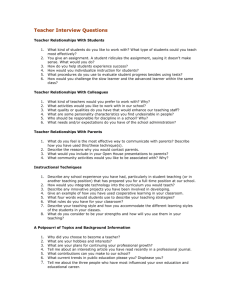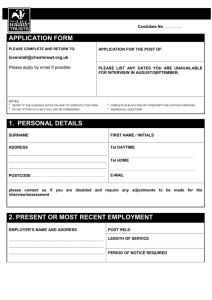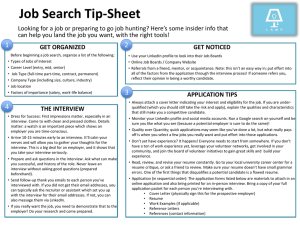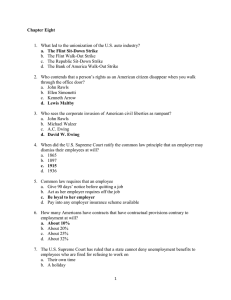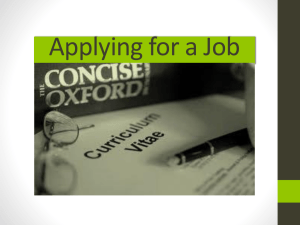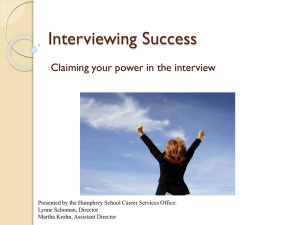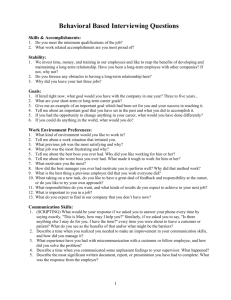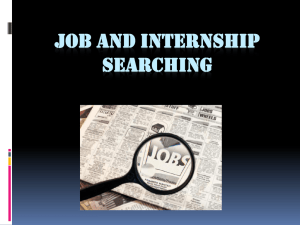CV and Interview Advice (2)
advertisement
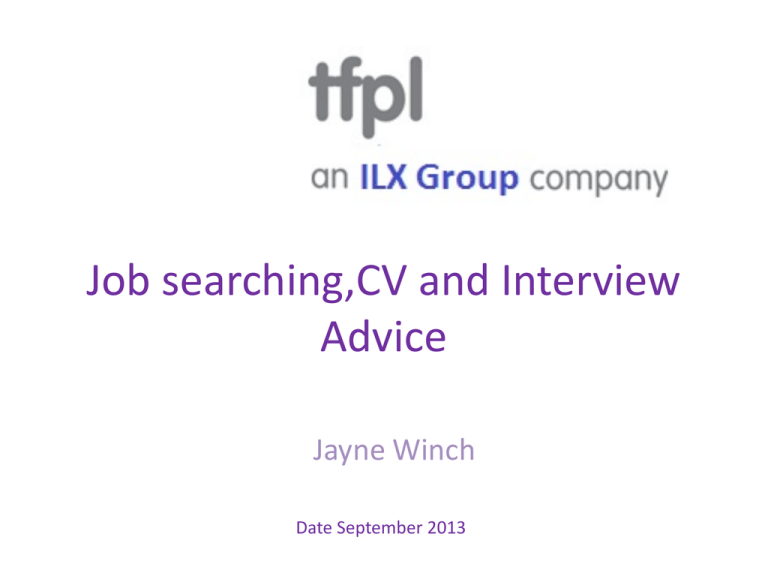
Job searching,CV and Interview Advice Jayne Winch Date September 2013 Job searching techniques • Jobs boards (Total jobs, Monster, Indeed, local boards – jobs in Surrey, jobs.ac.uk. LIS link etc) • Company websites and their RSS feeds • Referrals through friends/networking events • LinkedIn/Twitter and social media • Digital brand! Copyright TFPL 2013 Digital brand • Twitter - do Tweet and offer opinion but don’t be too controversial • Get involved in discussions • Follow interest groups on here • Keep LinkedIn profile up to date. Would be expected to be on it • Blogs – eg,motor blog, got a job through this! He became well known in this sector through his blogging • Commenting on blogs is a good way to get noticed • Facebook – be careful, employers check pages Copyright TFPL 2013 Layout of the CV • • • • • • Name Address Contact details Profile Education Current/most recent job • Career to date • Professional activities • Technical experience/other skills • Other interests • References optional Characteristics of a winning CV • • • • • • no more than 2 pages if possible easy to follow and to read personal profile at the top salient points are up front and well set out truthful and logical – avoid cliches emphasis given to most recent/relevant job or qualification (reverse chronological order) • positive and interesting • makes you want to know more – don’t include your life story! • references available on request Interviews Purpose of the interview > Meet the employer > Sell your strengths and skills as they relate to the employer and position > Learn about the employer and position > Assess if the employer/position are a good fit for your career goals, values and needs. They may not be! > Practice for other interviews > Use the interview with agencies as a practice Types of Interview > Traditional > Behavioural > Team / panel Traditional > Requires you to relay factual information > Employer is taking your word at face value > Sample Questions: • Tell me about yourself? • Why are you interested in this role? • What are your weaknesses? Behavioural > Employer makes assumptions about your future performance based on past behaviours and attitudes > Requires you to offer concrete, specific examples > Sample questions • Tell me about a time when you showed team work • Give me an example of a challenge you faced and how you dealt with it General Preparation • Research the company, know who you’ll be meeting with and their position • Look at interviewers’ LinkedIn profiles/company profile • Re-read the job description • Create a list of questions to ask about the position and the company • Arrive a little early Etiquette • Be on time • Turn off your phone • Shake hands firmly at the beginning and end of the interview • Maintain good eye contact • Dress appropriately The Day of the Interview • • • • Speak positively about yourself and others Use body language to show interest Nod, sit forward, sit up straight, smile! Reflect on the interview • What did I do well? • What could I prepare better for next time? • Keep a folder/spreadsheet of roles applied for Success Factors • • • • • • • Communication skills (including listening) Problem solving skills Interest in industry/role Interpersonal skills Enthusiasm Confidence Focus – don’t go off at a tangent At the interview - DON’T > > > > > > Be intimidated Be late Undervalue yourself Be too familiar Criticize your employer Give monosyllabic replies Reflection • Assess what worked, what didn’t • Keep a folder/spreadsheet of the roles applied for with notes • Get feedback from agencies/companies if applied directly • How could you prepare for next time? • Opportunity to take stock • Consider your career aspirations Copyright TFPL 2013 Thank you!
